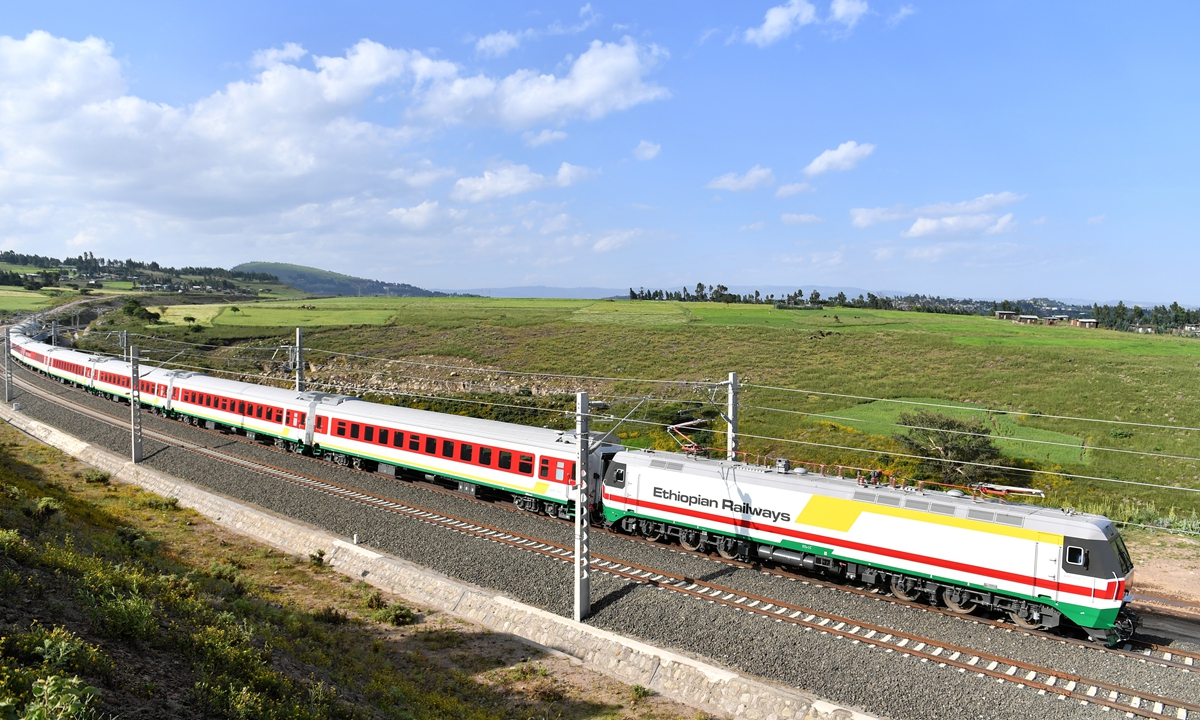
A train runs on the Addis Ababa-Djibouti Railway. Photo: Xinhua
Though the US has been stepping up efforts to pursue closer ties with African countries with a recent visit by US Secretary of State Antony Blinken and new infrastructure investment, China-Africa cooperation will continue to expand in years to come, as Chinese and African officials are set to map out close cooperation between the two sides through 2035 following a series of recent communication and exchanges.
Among many intimate interactions between China and Africa, the upcoming Eighth Ministerial Conference of the Forum on China-Africa Co-operation scheduled for next week will see China and Africa reveal their long-term partnership plans, including the China-African Cooperation Vision through 2035. Analysts said that despite the US' attempt to undermine China-Africa cooperation, the long-standing friendship and partnership between China and Africa will not change.
Blinken revealed on Saturday that the US and Senegal signed contracts worth more than $1 billion. Earlier, the US signed a $2.17 billion development assistance program with Nigeria, Reuters reported on Thursday.
During a press conference on Thursday in Nigeria, Blinken assured the media that the US' involvement in infrastructure in Africa was not about China or any other country, when he was asked to comment on China-US competition over infrastructure investment in Africa, the Reuters report said. However, he also raised issues such as debt and corruption in the use of foreign investments in Africa.
Although Blinken didn't explicitly blame China for the problems he referred to such as debt, experts said such words fit into the US' narrative against Chinese investments and underlined the US attempt to compete with China in Africa and even undermine China-Africa cooperation.
A Nigerian official also told the Global Times on condition of anonymity that Blinken's visit to Africa was intended to create obstacles to China's strengthening influence in Africa.
"Many US officials consider China-US competition as not merely a bilateral matter, but one that is extending into almost every region and every field. Considering Africa's rich resources and its potential to be a fast-growing economy in the future, it is expected that the US will develop a China-US wrestling field in Africa," Cui Hongjian, director of the Department of European Studies at the China Institute of International Studies, told the Global Times on Sunday.
He also said that blaming Chinese projects for causing debts in Africa is irrational, as it is difficult to launch private capital dominated projects at this stage when Africa's business capital is still underdeveloped. China-Africa cooperation will gradually shift from government loan projects to commercial loans with the region's economic development, said Cui.
The US' latest attempts in Africa also came at a time when China and Africa are engaged in increasingly intimate cooperation, ranging from the holding of the 6th China-Africa People's Forum last week to the Eighth Ministerial Conference of the Forum on China-Africa Co-operation, to be held in late November. During the latter forum, cooperation will be carried out in areas like health, investment, trade and climate change.
China's investment in Africa has spiraled up in recent years as more than 40 African countries joined the Belt and Road Initiative. By 2020, China's direct investment in African had surpassed $47.4 billion, covering a large number of areas, including manufacturing, mining and real estate, a government official at the Ministry of Commerce said recently.
Song Wei, a research fellow at the Chinese Academy of International Trade and Economic Cooperation, told the Global Times on Sunday that although Africa is not among the core concerns for the US, it has moved to undermine China's cooperation with Africa after it observed the healthy development of China-Africa ties in recent years.
Song said that Africa's development should not be exclusionary, and its investment creates opportunities for China and the US to seek cooperation, such as on climate change issues.




